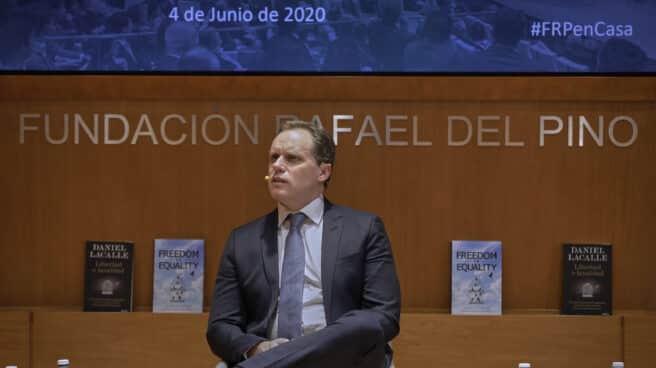

Archival image of Daniel Lacalle at the launch of his book
Daniel Lacalle, chief economist at Tressis, notes that the European Central Bank is going to accelerate rate hikes this year, and “is going to take it seriouslybecause the first attempt to curb inflation has not yet been made. For Lacalle, this is the mandate that the European organization has: price stability, “not that Spain and Italy finance themselves cheaply.”
Thus, the economist made it clear that he did not agree with the message of ECB President Christine Lagarde that they have the tools to ensure that peripheral countries are not left behind. Lacalle put it this way: “You can’t normalize monetary policy and not normalize it at the same time.”
The economist assured that the increase should be made “the sooner the better” and criticized Tressis during the presentation of the market forecast for the second half of the year for the fact that the rate increase is moderate, so as not to affect the economy. “It doesn’t make any sense because they generate side effects.”. Thus, Daniel Lacalle believes that stock markets are falling sharply and with great volatility because the ECB has explained what monetary normalization will look like.
“If you do it as soon as possible, the market will immediately accept it and realize two things. On the one hand, thatcentral banks will remain extremely accommodativeon the other hand, although financial conditions are getting tougher, they do not suffer significantly,” the Tressis expert explained.
The market also fears that rate hikes will trigger an economic downturn, but Lacalle pointed out that in the eurozone it will be a technical recession, not a crisis and made it clear that it will not be like the 2008 crisis, as the main difference is the financial sector, which is now more prosperous. According to Tressis’s chief economist, in 2008 it had serious liquidity and solvency problems: “The fact that the liquidity problem is added to the problem of solvency is not that it is far, but that it is very far.”
The economist pointed to three risks that could hurt the economy: an invasion of Ukraine, a “programmed” slowdown in China, and stagflation itself. However, he is optimistic about positive choices such as the expansion of manufacturing indexes,to recovering sectors such as tourism, strengthening the US labor market, or supporting fiscal and monetary policy.”
As Lacalle explained, for inflation to decrease, three things must happen simultaneously. The first is to raise interest rates, the second is to reduce the amount of money in the economy, i.e. “stop asset buybacks by central banks” and normalize government spending.
Thanks to these three factors, inflation will be reduced, he assured, although he acknowledged that some prices will remain high, such as oil or gas prices. “But other assets will fall. In the same way that not all assets rise at the same time, they also do not fall at the same time.. But headline inflation will fall.
Source: El Independiente